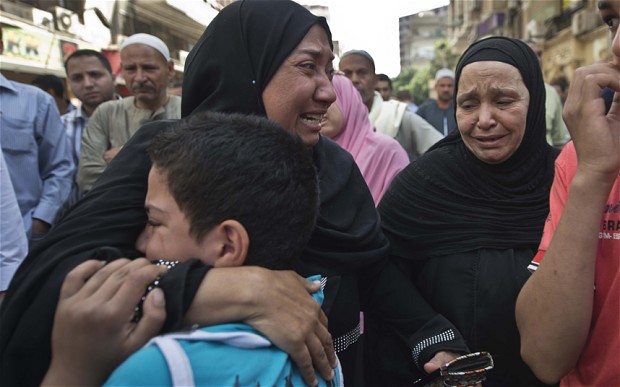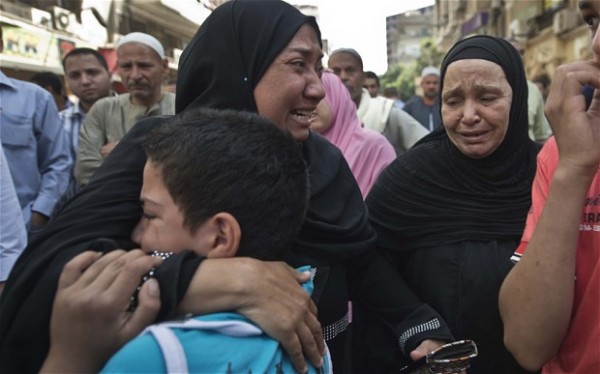
By: iol.co.za
Source: http://www.iol.co.za/
The United Nations and Washington have condemned death sentences handed to 683 alleged Islamists including Muslim Brotherhood leader Mohamed Badie in an Egyptian court on Monday after a brief hearing.
The court in the southern province of Minya sparked an international outcry with its initial sentencing last month, amid an extensive crackdown on supporters of ousted Islamist president Mohamed Morsi.
The crackdown has extended to secular-leaning dissidents who supported Morsi’s overthrow but have since turned on the army-installed regime.
The United States urged Egypt to reverse the court decision.
“Today’s verdict, like the one last month, defies even the most basic standards of international justice,” the White House said. “This verdict cannot be reconciled with Egypt’s obligations under international human rights law.”
UN Secretary General Ban Ki-moon was “alarmed” by the death sentences and feared it could impact the entire region, his spokesman said.
“Verdicts that clearly appear not to meet basic fair trial standards, particularly those which impose the death penalty, are likely to undermine prospects for long-term stability,” Ban said according to spokesman Stephane Dujarric.
The UN chief plans to discuss his concerns with Egyptian Foreign Minister Nabil Fahmy later this week.
The Minya court, presided over by judge Said Youssef Sabry, is set to confirm the death sentences on June 21. However, it also reversed 492 of 529 previous death sentences it passed in March, commuting most of them to life imprisonment.
In Cairo, another court banned the April 6 youth movement that spearheaded the 2011 revolt which toppled strongman Hosni Mubarak, following accusations it defamed Egypt and colluded with foreign parties.
Ban also expressed concern at that decision and the jailing of three “emblematic figures” of the 2011 uprising including two founders of the youth movement.
Under Egyptian law, death sentences are referred to the country’s top Islamic scholar for an advisory opinion before being ratified. A court may choose to commute the sentences, which can later be challenged at an appeals court.
Of the 683 sentenced on Monday, only 73 are in custody, prosecutor Abdel Rahim Abdel Malek said. The others have a right to a retrial if they turn themselves in.
Monday’s hearing lasted just 10 minutes, said Khaled Elkomy, a defence lawyer who was in court.
The verdict was the first against Badie, spiritual head of Morsi’s Muslim Brotherhood, among several trials he faces along with Morsi and other Brotherhood leaders.
Some female relatives waiting outside the courtroom fainted on hearing news of the verdict.
“Where is the justice?” others chanted.
A fugitive from the trial, who identified himself only as Gamal and said he was a member of the Brotherhood, lashed out at the court.
“This is a political trial against those who oppose the military,” said the 25-year-old, who was among the 683 sentenced Monday but who is in hiding.
The Brotherhood urged the world to act against “gross human rights violations and injustice committed by the military junta in Egypt against its own people”.
Those sentenced on Monday were accused of involvement in the murder and attempted murder of policemen in Minya province on August 14, the day police killed hundreds of Morsi supporters during clashes in Cairo.
Defence lawyers boycotted the last court session, branding it “farcical”.
British Foreign Secretary William Hague also urged a review of the sentences, saying they “damage the reputation of Egypt’s judicial system.”
Amnesty International also condemned the ruling.
“Egypt’s judiciary risks becoming just another part of the authorities’ repressive machinery, issuing sentences of death and life imprisonment on an industrial scale,” Amnesty’s Hassiba Hadj Sahraoui said in a statement.
Elkomy, the defence lawyer, said 60 percent of the 529 defendants sentenced in March, who include teachers and doctors, can prove they were not present during the unrest in Minya, where a police station was attacked.
Defence lawyers and relatives of defendants said those sentenced to death in March also included a man who was killed on August 14.
Last month’s death sentences sent a chill through opponents of the military-installed regime, which has held mass trials of thousands of alleged Islamists since Morsi’s ouster.
Amnesty says more than 1,400 people have been killed in the police crackdown since the army overthrew Morsi, Egypt’s first elected and civilian leader.




